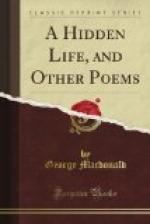So be thou will it; I am safe with thee.
I laugh exulting. Make me something, God;
Clear, sunny, veritable purity
Of high existence, in itself content,
And in the things that are besides itself,
And seeking for no measures. I have found
The good of earth, if I have found this death.
Now I am ready; take me when thou wilt.”
He laid the letter in his desk, with seal
And superscription. When his sister came,
He said, “You’ll find a note there—afterwards—.
Take it yourself to the town, and let it go.
But do not see the name, my sister true—
I’ll tell you all about it, when you come.”
And as the eve, through paler, darker shades,
Insensibly declines, and is no more,
The lordly day once more a memory,
So died he. In the hush of noon he died.
Through the low valley-fog he brake and climbed.
The sun shone on—why should he not shine
on?
The summer noises rose o’er all the land.
The love of God lay warm on hill and plain.
’Tis well to die in summer.
When the breath,
After a long still pause, returned no more,
The old man sank upon his knees, and said:
“Father, I thank thee; it is over now;
And thou hast helped him well through this sore time.
So one by one we all come back to thee,
All sons and brothers, thanking thee who didst
Put of thy fatherhood in our poor hearts,
That, having children, we might guess thy love.
And at the last, find all loves one in thee.”
And then he rose, and comforted the maid,
Who in her brother lost the pride of life,
Weeping as all her heaven were full of rain.
When that which was so like him—so unlike—
Lay in the churchyard, and the green turf soon
Would grow together, healing up the wounds
Of the old Earth who took her share again,
The sister went to do his last request.
Then found she, with his other papers, this,—
A farewell song, in lowland Scottish tongue:—
Greetna,
father, that I’m gaein’.
For
fu’ weel ye ken the gaet.
I’
the winter, corn ye’re sawin’—
I’
the hairst, again ye hae’t.
I’m
gaein’ hame to see my mither—
She’ll
be weel acquant or this,
Sair
we’ll muse at ane anither,
‘Tween
the auld word an’ new kiss.
Love,
I’m doubtin’, will be scanty
Roun’
ye baith, when I’m awa’;
But
the kirk has happin’ plenty
Close
aside me, for you twa.
An’
aboon, there’s room for mony—
’Twas
na made for ane or twa;
But
it grew for a’ an’ ony
Countin’
love the best ava’.
Here,
aneath, I ca’ ye father:
Auld
names we’ll nor tyne nor spare;
A’
my sonship I maun gather,
For
the Son is King up there.




